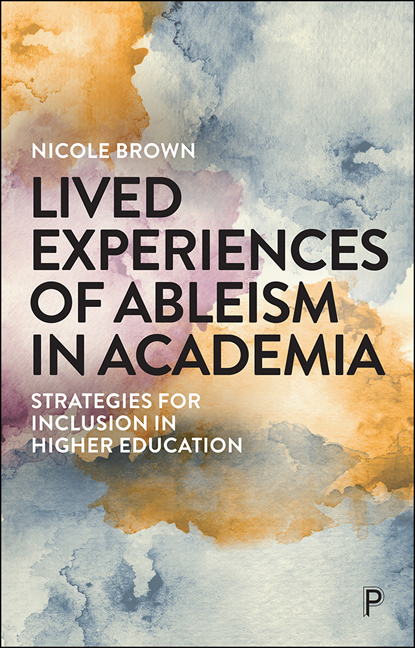Conclusion: Disability imaginary of the future
Published online by Cambridge University Press: 18 December 2021
Summary
Ableism in academia and the lived experiences
On 23 March 2018, the Ableism in Academia conference took place at the UCL Institute of Education. The event was unique for the UK higher education landscape in several ways. First, the conference offered delegates a safe space to exchange ideas and theorise experiences not from the vantage point of being a typical, fully ‘able-bodied and able-minded’ academic, but from the very personal and intimate understanding of what it means to not fit the mould. The conference was not at all limited or restricted to academics with disabilities, chronic illnesses and/or neurodivergences, but the nature of the topic clearly affected and interested that group of scholars the most. I know that every single delegate had one form of need or another. Second, and related to the fact that every delegate had disclosed some need, the conference was the first of its kind by way of accessibility and inclusion. The event was organised in such a way that delegates could participate in and contribute to within the halls of the conference setting, but also remotely from home. The organisation had included ensuring the right foods would be available, people would be able to see and hear and to withdraw and relax whenever and whichever way they needed to (see Brown et al, 2018 for full details). And third, the conference stood out for its aim to have a lasting effect on conference speakers, delegates and the volunteers involved. The topic of ableism in academia, and the emotions of frustration, stress, embarrassment and failure, were just too important and raw for the conference to be a passing fad. I was determined that the conference would lead to tangible results, such as practical recommendations for the sector and a beginning network of colleagues and friends, who would recognise each other's strengths and struggles. In many ways, the conference did keep that promise with particular strategies and recommendations having been implemented across a number of universities. Research institutions, grant funders and learned societies are also increasingly focusing on issues of accessibility, equality and inclusion; and I know that, although we were not the only ones to speak up at the time, our voices had impact. If the impact is already felt, one may ask what then the point is of this particular edited book.
- Type
- Chapter
- Information
- Lived Experiences of Ableism in AcademiaStrategies for Inclusion in Higher Education, pp. 315 - 322Publisher: Bristol University PressPrint publication year: 2021

